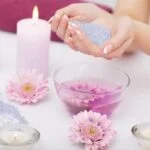Welcome to the enchanting world of lavender aromatherapy, where the captivating scent of this purple-hued flower embraces your senses and offers a myriad of therapeutic benefits. In recent years, lavender aromatherapy has gained immense popularity in the realm of alternative medicine, captivating individuals seeking natural remedies for stress relief, better sleep, and overall well-being.
This article will take you on a journey through the rich history, scientific mechanisms, and practical applications of lavender aromatherapy – uncovering its ancient legacy while shining a light on its modern-day healing potential.
Lavender essential oil, derived from the distillation process of lavender flowers, has long been revered for its calming properties and delightful fragrance. The benefits of lavender aromatherapy are vast, encompassing both physical and mental health.
It is known to promote relaxation, reduce anxiety levels, alleviate pain and headaches, improve sleep quality, and even aid in managing stress-related disorders. With such a wide range of therapeutic properties packed into one tiny bottle, it’s no wonder that lavender essential oil has become an essential component in many households around the world.
As we delve deeper into the wonders of lavender aromatherapy in this article, you will discover not only its origins steeped in ancient history but also the intricate science behind its effectiveness as a natural remedy. We will explore various practical ways to incorporate lavender aromatherapy into your daily routine – from diffusing essential oils to creating homemade sprays or bath products.
Furthermore, we will unravel the stress-relieving benefits and examine how lavender aids in inducing restful sleep. Additionally, we will address using lavender aromatherapy for pain management and highlight emerging trends that pave the way for exciting advancements in this field.
So join us on this aromatic journey as we unlock the secrets of lavender aromatherapy together. Prepare to be captivated by centuries-old wisdom combined with modern scientific evidence – all pointing to the soothing scent of lavender as a key to transforming your well-being.
Whether you are seeking relaxation, relief from pain, or simply an escape from the stress of everyday life, lavender aromatherapy has something to offer everyone. Let us dive into this world of possibility and embrace the soothing allure of lavender aromatherapy.
The Origins of Lavender
Lavender has a long and storied history that dates back thousands of years. This fragrant herb has been cultivated and cherished by various ancient civilizations, including Egypt, Greece, and Rome. The origins of lavender can be traced to the Mediterranean region, where it was first discovered and recognized for its medicinal properties.
In ancient Egypt, lavender was considered a sacred plant and was used in the embalming process of mummies. The Egyptians also cherished lavender for its aromatic qualities and utilized it in perfumes, cosmetics, and as an ingredient in bath rituals. Lavender’s soothing scent was believed to promote relaxation and enhance the feeling of well-being.
The Greeks were also avid users of lavender for its therapeutic benefits. They added dried lavender flowers to their baths to calm the nerves and aid in sleep. Lavender was highly regarded as a medicinal plant by famous physicians such as Dioscorides and Galen. It was often used to treat headaches, digestive issues, and respiratory ailments.
During the Roman era, lavender became even more popular due to its versatility. Romans used it not only for its fragrance but also as a natural remedy for various ailments. They infused their bathwater with lavender to relax their muscles after intense physical activities or combat. Lavender essential oil was also used topically for wound healing and as an insect repellent.
The historical significance of lavender is not limited to these three ancient civilizations alone. Lavender has left its mark on many cultures throughout history, including those in Asia, Africa, and Europe. Its enduring popularity speaks volumes about the incredible legacy of this remarkable herb.
| Ancient Civilization | Significance of Lavender |
|---|---|
| Egypt | Sacred plant used in embalming process; valued for perfumes and cosmetics. |
| Greece | Added to baths for relaxation and improved sleep; used medicinally by renowned physicians. |
| Rome | Used in bathwater for muscle relaxation; applied topically for wound healing and insect repelling. |
Unlocking the Power of Lavender Aromatherapy
Lavender Aromatherapy is more than just a pleasant scent – it has the power to soothe and heal. Understanding how lavender aromatherapy works can provide an even greater appreciation for its therapeutic benefits.
At the core of lavender aromatherapy’s effectiveness lies its interaction with our senses and nervous system. When we inhale the scent of lavender, it triggers a response in our brain that activates the release of chemicals like serotonin, which is responsible for regulating mood, sleep, and appetite. This process helps explain why lavender aromatherapy can have a calming effect on our emotions and promote relaxation.
In addition to its impact on mood, studies have shown that lavender contains compounds with powerful medicinal properties. One such compound is linalool, which exhibits both anti-anxiety and pain-relieving effects. Linalool interacts with receptors in the brain associated with stress and anxiety, helping to reduce these symptoms when exposed to lavender aromatherapy.
Another compound found in lavender essential oil is linalyl acetate, which has potent anti-inflammatory properties. This compound can help alleviate inflammation in various parts of the body, making it beneficial for conditions like headaches or muscle pain.
Scientific research has shown consistent evidence supporting the effectiveness of lavender aromatherapy for reducing stress and anxiety, promoting better sleep, relieving pain, and even improving cognitive function. These studies offer valuable insights into the mechanisms behind lavender’s therapeutic properties.
To further explore the science behind lavender aromatherapy and its potential benefits, researchers are conducting ongoing studies to uncover new applications and expand our understanding of this ancient therapy. As more research emerges, innovative ways to incorporate lavender into healthcare practices may arise.
Understanding the mechanisms of lavender aromatherapy enhances our appreciation for this natural remedy’s ability to promote well-being. The exploration of scientific research provides valuable evidence supporting its use as a complementary therapy for stress reduction, better sleep quality, pain management, and more. With a deeper understanding of how lavender interacts with our bodies, we can fully embrace the power of lavender aromatherapy for our own holistic health.
| Benefit | Mechanism |
|---|---|
| Stress Reduction | Lavender activates release of serotonin in the brain, promoting relaxation and emotional balance. |
| Better Sleep Quality | The scent of lavender helps regulate sleep patterns and induces relaxation, leading to improved sleep quality. |
| Pain Management | Lavender contains compounds with analgesic and anti-inflammatory properties, providing relief from pain and headaches. |
| Improved Cognitive Function | Lavender aromatherapy has been shown to have positive effects on cognitive performance and memory. |
Different Ways to Incorporate Lavender Aromatherapy into Your Daily Routine
Diffusing Essential Oils
One of the easiest and most popular ways to incorporate lavender aromatherapy into your daily routine is by using a diffuser. A diffuser is a device that disperses essential oils into the air, allowing you to enjoy their therapeutic benefits through inhalation.
To use lavender essential oil in a diffuser, simply add a few drops of the oil to the water reservoir and turn on the device. Within minutes, your space will be filled with the calming and soothing scent of lavender.
Using Lavender-Infused Bath Products
Taking a luxurious bath can be enhanced with the addition of lavender-infused bath products. Look for bath salts, bath bombs, or bubble baths that contain lavender essential oil or dried lavender flowers. These products not only provide an opportunity for relaxation but also allow the soothing properties of lavender to be absorbed through your skin. Fill your bathtub with warm water, add your chosen lavender-infused product, and immerse yourself in a tranquil oasis.
Creating Homemade Lavender-Based Sprays
Another way to incorporate lavender aromatherapy into your daily routine is by creating homemade sprays using lavender essential oil. You can make a refreshing linen spray by combining distilled water, witch hazel, and several drops of lavender essential oil in a spray bottle.
Use this spray on your bedding before sleep or whenever you need a quick refreshment throughout the day. You can also create a calming room spray by adding lavender essential oil to distilled water and spraying it around your living space to promote relaxation.
When incorporating any type of aromatherapy into your daily routine, it’s important to choose high-quality products or create them using pure essential oils sourced from reputable brands or suppliers. Additionally, everyone’s sensitivities may vary, so patch testing a small area of skin before using on larger areas is advisable. By exploring the different ways to incorporate lavender aromatherapy into your daily routine, you can experience the soothing and therapeutic benefits of this beautiful plant.
The Ultimate Guide to Lavender Aromatherapy for Stress Relief
Stress has become an all too common part of modern life, affecting our physical and mental well-being. Thankfully, nature offers us a powerful ally in the form of lavender aromatherapy. The use of lavender essential oil for stress relief has been practiced for centuries and continues to gain popularity today. In this ultimate guide, we will explore how lavender aromatherapy can help alleviate stress and promote relaxation.
One of the primary ways lavender aromatherapy helps reduce stress is through its ability to promote relaxation and emotional balance. The soothing scent of lavender has a calming effect on the nervous system, helping to ease feelings of tension and anxiety. Inhalation of lavender essential oil triggers the release of neurotransmitters like serotonin, which are responsible for regulating mood and promoting feelings of well-being.
There are various techniques you can incorporate into your daily routine to experience the stress-relieving benefits of lavender aromatherapy. One popular method is through massage therapy using lavender-infused oils or lotions. Massage not only helps relax tense muscles but also allows the therapeutic properties of lavender to be absorbed by the body, providing deep relaxation and stress relief.
Meditation is another effective way to integrate lavender aromatherapy into your stress management routine. Before starting your meditation practice, create a calm and serene environment by diffusing lavender essential oil or placing dried lavender flowers nearby. As you settle into your meditation session, focus on inhaling deeply and allowing the soothing aroma of lavender to wash over you, bringing a sense of tranquility and peace.
Incorporating lavender aromatherapy into your daily life can be a game-changer in managing stress levels. By embracing this natural approach, you can find solace in the delicate scent of lavender while reclaiming peace and balance amidst life’s challenges.
Healing Benefits of Lavender Aromatherapy for Sleep Disorders
Exploring the Connection Between Lavender Aromatherapy and Sleep Disorders
Sleep disorders such as insomnia, sleep apnea, and restless leg syndrome can have a significant impact on an individual’s overall well-being. Lack of quality sleep can lead to daytime fatigue, impaired cognitive abilities, and a range of physical and mental health issues. However, lavender aromatherapy has emerged as a promising natural remedy for treating sleep disorders and improving sleep quality.
The Calming Effects of Lavender on Sleep Patterns
Lavender essential oil has been found to possess sedative properties that help promote relaxation and induce restful sleep. The unique scent of lavender stimulates the brain’s limbic system, which is responsible for regulating emotions and promoting relaxation. Inhaling the aroma of lavender promotes the production of calming neurotransmitters like GABA (gamma-aminobutyric acid), which helps regulate sleep patterns and reduce anxiety.
Moreover, studies have shown that lavender aromatherapy not only improves the duration of sleep but also enhances its quality. Research conducted on individuals with mild insomnia found that those who were exposed to lavender scent before bedtime experienced deeper sleep with increased energy levels upon waking up.
Practical Tips for Incorporating Lavender Aromatherapy into Your Sleep Routine
To harness the healing benefits of lavender aromatherapy for sleep disorders, there are various methods you can try:
- Diffusing Essential Oils: Use a diffuser to disperse lavender essential oil throughout your bedroom before going to bed. This allows you to inhale the soothing fragrance as you drift off into slumber.
- Pillow Sprays: Create your own DIY pillow mist by combining water, witch hazel or vodka, and a few drops of lavender essential oil in a spray bottle. Spritz your pillow lightly before bedtime for a calming effect.
- Bath Soaks: Add a few drops of lavender essential oil or dried lavender flowers to your bathwater. The warm water will release the relaxing scent of lavender, helping you unwind before bedtime.
Remember, it’s important to use high-quality lavender essential oils for optimal benefits. Look for oils that are 100% pure and organic, and consider consulting with an aromatherapist for personalized guidance on dosage and usage. With the power of lavender aromatherapy as a natural sleep aid, achieving restful nights and refreshed mornings may be within reach.
Lavender Aromatherapy for Natural Pain Relief and Headache Management
When it comes to finding natural remedies for pain relief and headache management, lavender aromatherapy holds incredible potential. The soothing properties of lavender essential oil have long been recognized for their ability to alleviate discomfort and promote relaxation. Whether it’s a tension headache, muscle pain, or even chronic conditions like migraines, incorporating lavender aromatherapy into your wellness routine may offer some much-needed relief.
The analgesic and anti-inflammatory properties of lavender essential oil make it a valuable tool in managing pain. Lavender contains compounds such as linalool and linalyl acetate that contribute to its therapeutic effects. These compounds work synergistically to reduce inflammation, relax muscles, and soothe the nervous system. By inhaling the aromatic molecules of lavender, you can activate the body’s pain-relieving response, helping to alleviate discomfort naturally.
There are various ways to incorporate lavender aromatherapy into your pain management routine. One effective method is through the use of lavender compresses or topical application. Mixing a few drops of high-quality lavender essential oil with a carrier oil like coconut or jojoba oil can create a soothing massage blend for targeted pain relief. Gently massaging this mixture onto areas of tension or discomfort can provide localized relief and relaxation.
It is important to note that while lavender aromatherapy is generally safe for most individuals, caution should be exercised when using it topically or via other methods. It is recommended to consult with a healthcare professional before trying new remedies, especially if you have any known sensitivities or allergies. Additionally, proper dilution ratios should be followed when using lavender essential oil topically to avoid skin irritation.
Overall, incorporating lavender aromatherapy into your pain management routine offers a natural alternative that may help relieve discomfort without relying on medication alone. Its soothing scent and therapeutic properties make it an enticing option for those seeking holistic approaches to pain relief and headache management. By exploring the power of lavender aromatherapy, you may find yourself on a path towards greater comfort and well-being.
The Future of Lavender Aromatherapy
As the popularity of lavender aromatherapy continues to grow, researchers and experts are constantly exploring new innovations and emerging trends in this field. With advancements in technology and a greater understanding of the therapeutic properties of lavender essential oil, the future looks promising for lavender aromatherapy.
One exciting trend on the horizon is the development of lavender-based products in the skincare and beauty industry. Recognizing the soothing and nourishing effects of lavender on the skin, more companies are incorporating lavender into their formulations. From facial cleansers to body lotions, these products aim to provide not only physical benefits but also promote relaxation and emotional well-being through the use of lavender aromatherapy.
Another area that holds promise for the future is the integration of virtual reality (VR) technology with lavender aromatherapy. VR has already been utilized in healthcare settings for pain management and stress reduction, and researchers are now exploring how combining VR with aromatic environments can enhance the therapeutic effects.
Imagine being immersed in a virtual field of blooming lavenders while inhaling a gentle waft of their scent – this innovative approach could revolutionize relaxation techniques and further deepen the experience of lavender aromatherapy.
Additionally, as sustainable practices gain traction across industries, there is increasing emphasis on eco-friendly production methods for essential oils like lavender. The future of lavender aromatherapy lies heavily in ethical sourcing and environmentally conscious cultivation to ensure that high-quality oils are accessible without causing harm to ecosystems or compromising sustainability efforts.
Conclusion
In conclusion, lavender aromatherapy offers a multitude of benefits and therapeutic properties that can promote overall well-being. Throughout history, lavender has been revered for its soothing qualities and has found its place in various cultures across the globe. Today, scientific evidence supports the effectiveness of lavender aromatherapy in reducing stress, anxiety, promoting sleep, managing pain and headaches, and even potentially aiding in future treatments and therapies.
To incorporate lavender aromatherapy into your daily routine, there are numerous practical applications to choose from. Whether it’s diffusing essential oils, using lavender-infused bath products, or creating homemade sprays and sachets, there are endless possibilities to surround yourself with the calming scent of lavender. Additionally, selecting high-quality essential oils or dried flowers is crucial for optimal benefits.
For those seeking stress relief or better sleep, lavender aromatherapy can be particularly beneficial. Inhaling this soothing scent can promote relaxation, emotional balance, and enhance sleep quality by helping to regulate sleep patterns. Techniques such as massage or meditation incorporating lavender can further amplify these effects.
Furthermore, individuals suffering from chronic pain or frequent headaches may find relief through lavender aromatherapy. Lavender’s analgesic and anti-inflammatory properties make it a natural choice for pain management. However, caution should be exercised regarding dosage and proper dilution to avoid any potential side effects.
Frequently Asked Questions
What does lavender aromatherapy do?
Lavender aromatherapy involves using lavender essential oil or products infused with the scent of lavender to promote relaxation and improve mental well-being. When inhaled, the aromatic compounds from lavender can stimulate certain receptors in our nasal passages, which send signals to the brain and trigger responses related to emotions and mood.
The scent of lavender has a calming effect, helping to reduce anxiety and stress, as well as promoting better sleep quality.
What are the benefits of smelling lavender?
Smelling lavender has a wide range of benefits for both the mind and body. One of the key advantages is its ability to alleviate stress and anxiety by promoting relaxation. The soothing aroma of lavender can lower heart rate and blood pressure, creating a sense of calmness and tranquility.
Additionally, smelling lavender can also help improve sleep quality by easing insomnia symptoms. It’s believed that the scent enhances sleep duration and promotes deep sleep.
What does lavender scent do to the brain?
When we smell lavender, it triggers various reactions within the brain due to its impact on different areas involved in mood regulation, emotional processing, and relaxation. Research suggests that inhaling lavender scent activates certain areas in the brain associated with calming effects and emotional stability, such as the amygdala and hippocampus.
These regions play crucial roles in modulating emotions like fear, anxiety, and stress response. Through these mechanisms, lavender scent may promote feelings of relaxation while reducing symptoms of anxiety or agitation in some individuals.

Are you looking for a natural way to improve your health and wellbeing?
If so, aromatherapy may be the answer for you.





